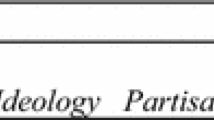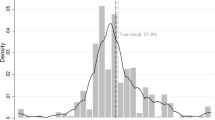Abstract
We attempt to explain why some constitutents are well informed and others are poorly informed about the positions taken by their U.S. Senators. The acquisition of political information is modeled in a Bayesian framework. A constituent with virtually no information about a candidate assigns him an average position on a liberal/conservative spectrum. As more political information is acquired with more political involvement, the constituent shifts her prior toward the politician's actual position and thus has a smaller error in assessing positions taken by her representative. In the Bayesian framework, voters make larger errors in evaluating the records of party mavericks than of typical party members.
The model is tested using data from the 1982 American National Election Study. Data on the respondent's perceived ideology of their Senators and their socioeconomic characteristics are combined with information on the Senators' actual ideology, length of time in the Senate, political party, and candidacy for re-election in 1982. The empirical analysis provides support for our predictions.
Similar content being viewed by others
References
Achen, C.H. (1975). Mass political attitudes and the survey response.American Political Science Review 69: 1218–1231.
Adams, J.D. and Kenny, L.W. (1986). Optimal tenure of elected public officials.Journal of Law and Economics 29 (October): 303–328.
Aldrich, J.H. and McKelvey, R.D. (1977). A method of scaling with applications to the 1968 and 1972 presidential elections.American Political Science Review 71: 111–130.
Alesina, A. and Cukierman, A. (1990). The politics of ambiguity.The Quarterly Journal of Economics 105 (4): 829–850.
Becker, G.S. (1983). A theory of competition among pressure groups for political influence.Quarterly Journal of Economics 98 (August): 371–400.
Becker, G.S. (1985). Public policies, pressure groups, and dead weight cost.Journal of Public Economics 28 (December): 329–347.
Bennett, J.T. and Mayberry, E.R. (1979). Federal tax burdens and grant benefits to states: The impact of imperfect representation.Public Choice 34 (3/4): 255–269.
Calvert, R.L. (1980). The role of imperfect information in electoral politics. Unpublished Ph.D. dissertation, California Institute of Technology.
Calvert, R.L. (1986). Models of imperfect information in politics. London: Harwood Academic Publishers.
Chappell, H.W. (1989). Campaign advertising and political ambiguity. Working paper, University of South Carolina.
Collier, K., Ordeshook, P.C. and Williams, K. (1989). The rationally uninformed electorate: Some experimental evidence.Public Choice 60: 3–29.
Converse, P.E. (1970). Attitudes and non-attitudes: Continuation of a dialogue. In E.R. Tufte (Ed.),The quantitative analysis of social problems, 168–189. Reading, MA: Addison-Wesley.
Dougan, W.R. and Munger, M.C. (1989). The rationality of ideology.Journal of Law and Economics 32: 119–142.
Downs, A. (1957).An economic theory of democracy. New York: Harper and Row.
Erikson, R.S. (1979). The SRC panel data and mass political attitudes.British Journal of Political Science 9: 89–114.
Feld, S.L. and Grofman, B. (1981). Ideological consistency as a collective phenomenon.American Political Science Review 82: 773–788.
Filer, J.E., Kenny, L.W. and Morton, R. (1991). Voting laws, educational policies, and minority turnout.Journal of Law and Economics 34, 2 pt. 1 (October): 371–393.
Filer, J.E., Kenny, L.W. and Morton, R. (1993). Redistribution, income, and voting.American Journal of Political Science 37 (February): 63–87.
Harrington, J.E. (1992a). The revelation of information through the electoral process: An exploratory analysis.Economics and Politics 4: 255–276.
Harrington, J.E. (1992b). Modelling the role of information in elections.Mathematical and Computer Modelling 16: 133–145.
Kalt, J.P. (1981).The economics and politics of oil price regulation. Cambridge, MA: MIT Press.
Kalt, J.P. and Zupan, M.A. (1984). Capture and ideology in the economic theory of politics.American Economic Review 74 (June): 279–300.
Kalt, J.P. and Zupan, M.A. (1990). The apparent ideological behavior of legislators: Testing for principal-agent slack in political institutions.Journal of Law and Economics 33 (April): 103–131.
Kau, J.B. and Rubin, P.H. (1979). Self-interest, ideology, and logrolling in congressional voting.Journal of Law and Economics 22 (October): 365–384.
Kau, J.B., Keenan, D. and Rubin, P.H. (1982). A general equilibrium model of congressional voting.Quarterly Journal of Economics 97, 2, (May): 271–293.
Kmenta, J. (1986).Elements of econometrics. New York: Macmillan.
McKelvey, R.D. and Ordeshook, P.C. (1985). Elections with limited information: A fulfilled expectations model using contemporaneous poll and endorsement data as information sources.Journal of Economic Theory 36: 55–85.
McKelvey, R.D. and Ordeshook, P.C. (1987). Elections with limited information: A multidimensional model.Mathematical Social Sciences 14: 77–99.
McKelvey, R.D. and Zavonia, W. (1975). A statistical model for the analysis of ordinal level dependent variables.Journal of Mathematical Sociology 4 (1): 103–120.
Mitchell, E.J. (1979). The basis of congressional energy policy.Texas Law Review 57: 591–613.
Morton, R.B. (1991). An analysis of legislative inefficiency and ideological behavior.Public Choice 69: 211–222.
Nelson, D. and Silberberg, E. (1987). Ideology and legislator shirking.Economic Inquiry 25 (January): 15–25.
Palfrey, T. and Poole, K. (1987). The relationship between information, ideology, and voting behavior.American Journal of Political Science 31: 511–530.
Peltzman, S. (1984). Constituent interest and congressional voting.Journal of Law and Economics 27 (April): 181–210.
Poole, K.T. (1981). Dimensions of interest group evaluation of the U.S. Senate, 1969–1978.American Journal of Political Science 25: 49–67.
Poole, K.T. and Rosenthal, H. (1989). Patterns of congressional voting. Carnegie Mellon GSIA Working Paper # 88-89-07.
Powell, L.W. (1989). Analyzing misinformation: Perceptions of congressional candidates' ideologies.American Journal of Political Science 33 (February): 272–293.
Reed, W.R. (1989). Information in political markets: A little knowledge can be a dangerous thing. Working paper, Texas A&M University.
Schultz, T.W. (1975). The value of the ability to deal with disequilibria.Journal of Economic Literature 13 (September): 827–846.
Shepsle, K.A. (1972). The strategy of ambiguity: Uncertainty and electoral competition.American Political Science Review 66: 555–568.
Author information
Authors and Affiliations
Additional information
We are grateful to an anonymous referee, John Aldrich, David Denslow, Bernie Grofman, Jinook Jeong, Laura Langbein, Mark Rush, and Seminar participants at the University of Florida, SUNY-Stony Brook, 1990 Public Choice Meetings, and the 1990 American Political Science Association Meetings for their helpful comments.
Rights and permissions
About this article
Cite this article
Husted, T.A., Kenny, L.W. & Morton, R.B. Constituent errors in assessing their Senators. Public Choice 83, 251–271 (1995). https://doi.org/10.1007/BF01047746
Accepted:
Issue Date:
DOI: https://doi.org/10.1007/BF01047746




